- Home›
- Healthy Living›
- Foods To Eat For Thyroid Health
Foods To Eat For Thyroid Health
By: Priyanka Maheshwari Thu, 29 June 2023 7:04:24
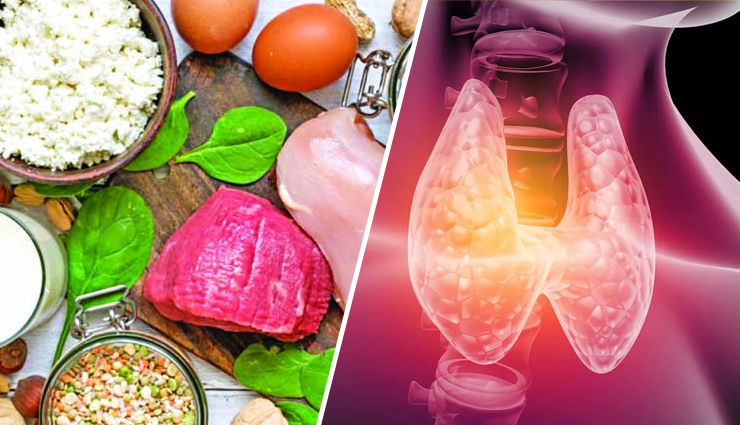
Thyroid health refers to the proper functioning of the thyroid gland, a butterfly-shaped gland located in the front of the neck. The thyroid gland plays a crucial role in regulating various bodily functions, including metabolism, energy production, growth, and development.
The thyroid gland produces hormones, primarily triiodothyronine (T3) and thyroxine (T4), which are responsible for regulating the body's metabolism. These hormones influence the functioning of organs, tissues, and cells throughout the body, affecting processes such as heart rate, body temperature, digestion, and mood.
Thyroid health is essential for overall well-being, as an imbalance in thyroid hormone production can lead to various health issues. There are two main types of thyroid disorders:
Hypothyroidism: This occurs when the thyroid gland does not produce enough thyroid hormones. Symptoms may include fatigue, weight gain, dry skin, constipation, depression, and cold sensitivity.
Hyperthyroidism: This occurs when the thyroid gland produces an excess of thyroid hormones. Symptoms may include weight loss, increased heart rate, anxiety, irritability, tremors, and heat intolerance.
In this article, we will explore the foods that are beneficial to include in a thyroid-friendly diet to promote thyroid health.
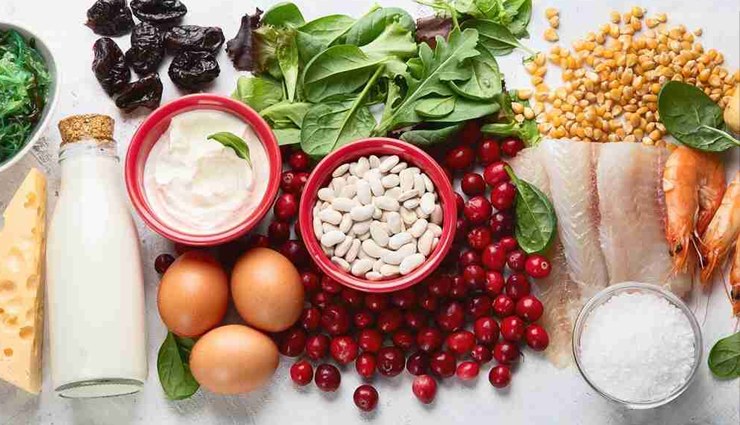
# Iodine-Rich Foods
Iodine is an essential mineral that plays a crucial role in maintaining thyroid health. The thyroid gland relies on iodine to produce thyroid hormones, primarily triiodothyronine (T3) and thyroxine (T4). These hormones are responsible for regulating metabolism, growth, and development throughout the body. Including iodine-rich foods in your diet is important to ensure an adequate supply of this mineral for the thyroid gland. Here are some examples of iodine-rich foods that can be beneficial for thyroid health:
Seafood: Seaweed (such as nori, kelp, and wakame), fish (such as cod, tuna, and shrimp), and shellfish (such as oysters and mussels) are excellent sources of iodine.
Dairy Products: Milk, cheese, and yogurt are often fortified with iodine, making them good dietary sources.
Iodized Salt: Table salt fortified with iodine is a common source of this mineral. However, it's important to consume it in moderation, as excessive salt intake can have negative health effects.
Eggs: Eggs are a natural source of iodine, particularly the yolks.
Cranberries and Prunes: These fruits contain moderate levels of iodine and can be included in a balanced diet.

# Selenium-Rich Foods
Selenium is a trace mineral that is essential for thyroid health. It plays a vital role in the synthesis and metabolism of thyroid hormones. Including selenium-rich foods in your diet can have several benefits for thyroid function. Selenium is necessary for the conversion of the thyroid hormone T4 (thyroxine) into its active form, T3 (triiodothyronine). T3 is the more biologically active hormone that is responsible for regulating metabolism and supporting overall health. Here are some examples of selenium-rich foods that can be beneficial for thyroid health:
Brazil Nuts: Brazil nuts are one of the best dietary sources of selenium. Just a few nuts a day can provide the recommended daily intake of selenium. However, be mindful of portion sizes, as Brazil nuts are high in calories.
Fish and Seafood: Certain types of fish and seafood are rich in selenium. Tuna, salmon, sardines, shrimp, and cod are good options to include in your diet.
Poultry and Meat: Chicken, turkey, and beef are sources of selenium. Opt for lean cuts of meat and poultry to keep your diet balanced.
Eggs: Eggs contain small amounts of selenium, particularly in the yolk. They can be a part of a selenium-rich diet.
Legumes: Foods like lentils, chickpeas, and black beans provide selenium along with other nutrients like fiber and protein.
Whole Grains: Whole grains, such as brown rice, quinoa, and oats, contain selenium as well as other essential nutrients that support overall health.

# Foods Rich in Omega-3 Fatty Acids
Omega-3 fatty acids are a type of polyunsaturated fat that are essential for overall well-being, including thyroid function. Omega-3 fatty acids have anti-inflammatory properties, which can help reduce inflammation in the body, including the thyroid gland. Inflammation in the thyroid, often seen in autoimmune thyroid conditions like Hashimoto's thyroiditis, can impair thyroid function. By reducing inflammation, omega-3 fatty acids may support a healthier thyroid environment. Sources of omega-3 fatty acids include:
Fatty Fish: Cold-water fish like salmon, mackerel, sardines, and trout are excellent sources of omega-3 fatty acids. Aim to include fatty fish in your diet at least twice a week.
Flaxseeds and Chia Seeds: These seeds are rich in alpha-linolenic acid (ALA), a type of omega-3 fatty acid. Ground flaxseeds and chia seeds can be added to smoothies, cereals, or used as a topping for salads or yogurt.
Walnuts: Walnuts are a plant-based source of omega-3 fatty acids. Snack on a handful of walnuts or incorporate them into your meals for added nutritional benefits.
Hemp Seeds: Hemp seeds are a good source of omega-3 fatty acids and can be added to smoothies, sprinkled on salads, or used in baking.
Algal Oil: Algal oil is derived from algae and provides a vegetarian or vegan source of omega-3 fatty acids. It is available in supplement form.
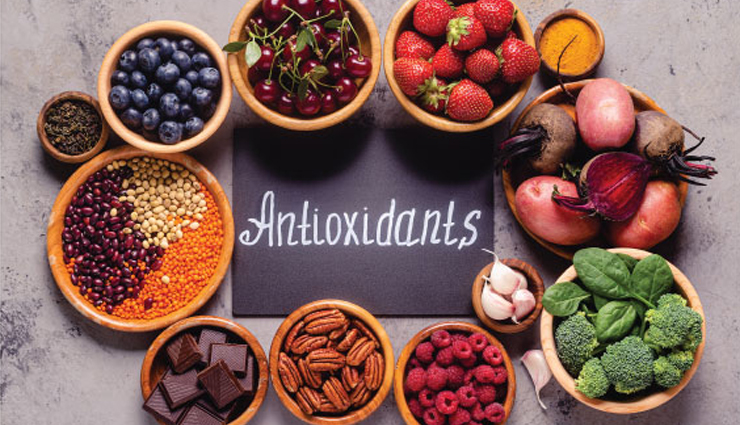
# Antioxidant-Rich Fruits and Vegetables
Antioxidant-rich fruits and vegetables offer numerous benefits for thyroid health. Antioxidants are compounds that help protect the body's cells from damage caused by harmful free radicals. Including a variety of antioxidant-rich fruits and vegetables in your diet can support thyroid function and overall well-being. Some antioxidants, such as selenium and zinc, play a crucial role in the conversion of thyroid hormones. They support the enzymatic processes necessary for the conversion of the inactive thyroid hormone T4 into the active form T3, which is essential for proper thyroid function. Here are some examples of antioxidant-rich fruits and vegetables that are beneficial for thyroid health:
Berries: Blueberries, strawberries, raspberries, and blackberries are packed with antioxidants like anthocyanins, which have been shown to reduce inflammation and oxidative stress.
Leafy Greens: Spinach, kale, Swiss chard, and other leafy greens are excellent sources of antioxidants, including vitamin C, beta-carotene, and lutein.
Cruciferous Vegetables: Broccoli, cauliflower, cabbage, Brussels sprouts, and kale are part of the cruciferous vegetable family. They contain antioxidants like glucosinolates and sulforaphane, which have anti-inflammatory properties.
Citrus Fruits: Oranges, grapefruits, lemons, and limes are rich in vitamin C, a potent antioxidant that supports immune function and helps reduce oxidative stress.
Colorful Peppers: Bell peppers, especially the red, orange, and yellow varieties, are rich in antioxidants such as vitamin C and beta-carotene.
Tomatoes: Tomatoes are a good source of the antioxidant lycopene, which has been associated with reduced risk of certain cancers and cardiovascular disease.
Sweet Potatoes: Sweet potatoes are packed with beta-carotene, a powerful antioxidant that the body converts into vitamin A.
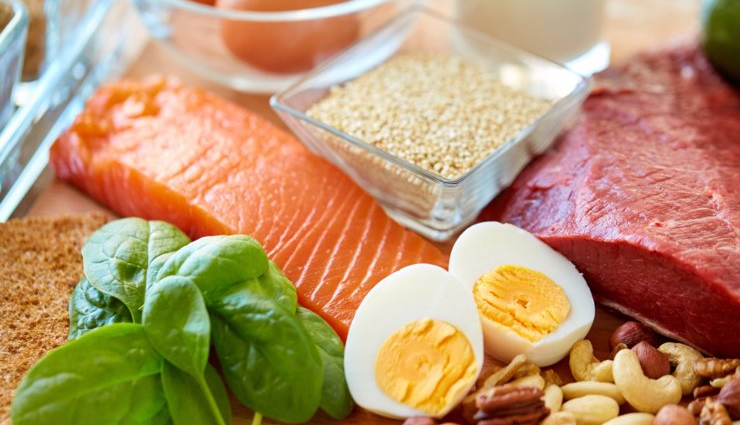
# Lean Proteins
Lean proteins are beneficial for thyroid health as they provide essential nutrients and support overall well-being. Including lean protein sources in your diet can have several positive effects on thyroid function. Proteins are made up of amino acids, which are the building blocks of tissues and hormones in the body. The thyroid gland relies on specific amino acids, such as tyrosine and phenylalanine, to produce thyroid hormones. Adequate intake of lean proteins ensures a sufficient supply of these essential amino acids for proper thyroid hormone synthesis. Here are some examples of lean protein sources that are beneficial for thyroid health:
Skinless Poultry: Chicken and turkey breast are excellent sources of lean protein. They provide essential amino acids without the added fat.
Fish: Fatty fish like salmon, mackerel, and trout are rich in omega-3 fatty acids and high-quality protein. They offer additional benefits for thyroid health, as discussed earlier.
Legumes: Beans, lentils, and chickpeas are plant-based sources of lean protein. They also provide fiber and other nutrients that support digestive health.
Low-Fat Dairy Products: Greek yogurt, cottage cheese, and skim milk are low-fat dairy options that are high in protein and calcium, which is important for thyroid function.
Eggs: Eggs are a versatile and affordable source of lean protein. They contain all essential amino acids and provide important nutrients like vitamin D.
Lean Meats: Opt for lean cuts of beef, pork, and lamb to minimize saturated fat intake while still obtaining valuable protein.
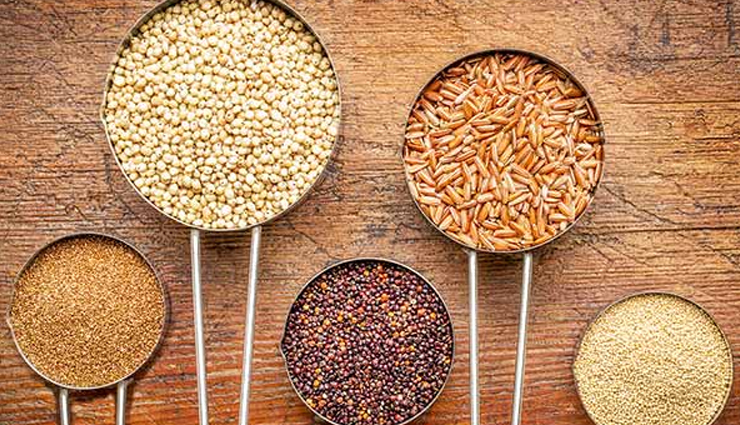
# Whole Grains
Whole grains offer several benefits for thyroid health and overall well-being. Including whole grains in your diet can provide essential nutrients, promote balanced energy levels, and support a healthy metabolism. Here are some examples of whole grains that are beneficial for thyroid health:
Brown Rice: Brown rice is a nutritious whole grain that is rich in fiber, B vitamins, and minerals. It is a versatile grain that can be used in various dishes.
Quinoa: Quinoa is a gluten-free whole grain that is packed with protein, fiber, and essential nutrients. It is a complete protein source, meaning it provides all nine essential amino acids.
Oats: Oats are a fiber-rich whole grain that can support digestive health and provide sustained energy. They also contain selenium and other important nutrients.
Whole Wheat: Whole wheat products, such as whole wheat bread, pasta, and couscous, retain the bran and germ, making them more nutritious compared to refined grains.
Barley: Barley is a nutritious whole grain that is high in fiber, selenium, and antioxidants. It can be used in soups, salads, and side dishes.
Millet: Millet is a gluten-free grain that is rich in fiber and magnesium. It can be used in various recipes, such as porridge, pilafs, and baked goods.





